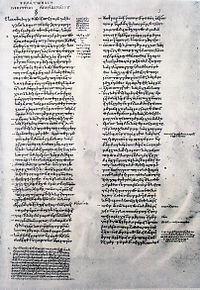Plato's Republic

Title page of the oldest manuscript: Paris, Bibliothèque Nationale, Gr. 1807 (9th century)
|
|
| Author | Plato |
|---|---|
| Original title | Πολιτεία |
| Country | Ancient Greece |
| Language | Greek |
| Subject | Political philosophy |
| Published | c. 380 BCE |
The Republic (Greek: , Politeia; Latin: De Res Publica) is a Socratic dialogue, written by Plato around 380 BCE, concerning justice (), the order and character of the just city-state and the just man. It is Plato's best-known work, and has proven to be one of the world's most influential works of philosophy and political theory, both intellectually and historically.
In the book's dialogue, Socrates discusses the meaning of justice and whether or not the just man is happier than the unjust man with various Athenians and foreigners. They consider the natures of existing regimes and then propose a series of different, hypothetical cities in comparison. This culminates in the discussion of Kallipolis (Καλλίπολις), a hypothetical city-state ruled by a philosopher king. They also discuss the theory of forms, the immortality of the soul, and the role of the philosopher and that of poetry in society. The dialogues may have taken place during the Peloponnesian War.
While visiting the Piraeus with Glaucon, Polemarchus asks Socrates to join him for a celebration. Cephalus, Polemarchus, and Thrasymachus are then each asked their definitions of justice by Socrates. Cephalus defines justice as giving what is owed. Polemarchus says justice is "the art which gives good to friends and evil to enemies". Thrasymachus proclaims "justice is nothing else than the interest of the stronger". Socrates overturns their definitions and says that it is your advantage to be just and disadvantage to be unjust. The first book ends in aporia concerning its essence.
...
Wikipedia
